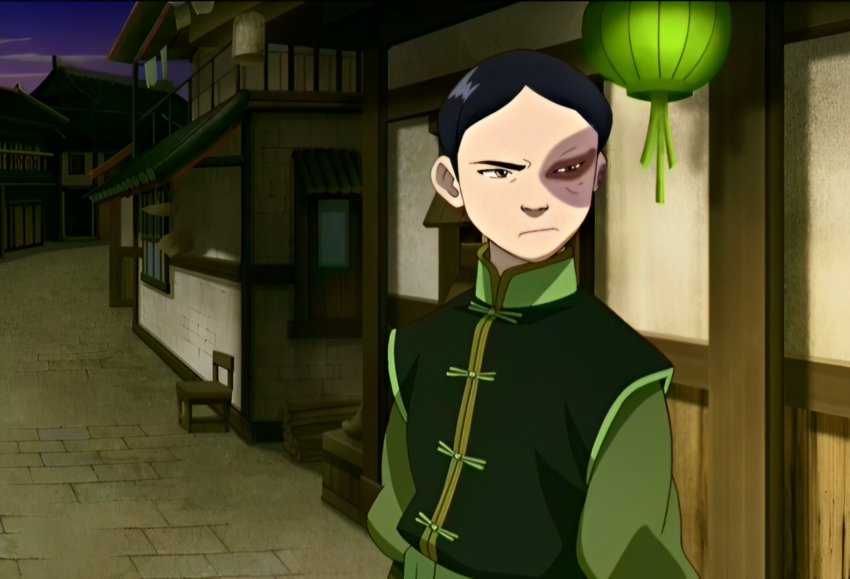The premise of most stories includes some type of a fish-out-of-water situation. If it didn’t, and the characters stayed safely tucked away in their comfort zones, it wouldn’t make for an interesting story. Although sometimes other elements, events, or even characters intrude into their world and make it uncomfortable, very often a character is forced to leave everything for the call to adventure, making them very much the fish-out-of-water.
But knowing how to fully demonstrate just how jarring this new situation is for your characters can be difficult. Most of us haven’t left absolutely everything we’ve known for a new adventure or situation. So how can we make our readers understand what we, as writers, haven’t even experienced?
To tackle this we’ll be looking at The Tale of Zuko.
Tale of Zuko
For Zuko and Iroh, it seemed to be a typical day at the teashop. That is, until Zuko discovers they were being followed. Every day without fail, the same girl appears at the teashop… and just watches him. After several days of this pattern, Zuko alerts Iroh that they may have a Fire Nation spy disguised as an Earth Kingdom citizen watching them, and Iroh chuckles.
“I’ve seen that girl in here quite a lot. It seems to me she might have quite a little crush on you.”
This announcement is so unexpected that Zuko reels backwards toward the counter, where the girl appears right behind him, ready to pay for her tea.
“Thank you for the tea!” she chirps, kindly. “What’s your name?”
“My name’s Lee…” Zuko admits, stiffly, accepting the coins and seeming to have no idea what to say to her.
This isn’t a problem for the girl, who has plenty to say to him. She introduces herself as Jin and asks Zuko if he’d be willing to go out with her after the tea shop closes. Before Zuko even begins to think of how he can respond, Iroh jumps in front of him and accepts on his behalf.
And so, several hours later, with his hair combed painfully straight and a glare that shows just how uncomfortable this entire situation makes him, Zuko steps outside the tea shop at sundown to meet Jin.
She appears around a corner, smiling at him as always and far more eager to begin the evening than he is. Throughout dinner and their walk around Ba Sing Se, Zuko has no idea how to keep up the conversation. Even what he does say is painfully awkward, obviously false, or even mildly insulting. But Jin takes it, like she seems to take everything, in stride.
She makes conversation with Zuko when he has no idea what to say, brushes aside awkward comments, and laughs at his attempts to joke. If he could see past his own nervous awkwardness, he would notice that she’s being surprisingly gracious and kind to him — and that Iroh’s suspicion that she really likes him is accurate.
But as the night goes on, we start to see him notice those aspects of her a little more. And even though that doesn’t mean he is no longer awkward or nervous, it does mean that he begins to look out for what she wants, too — something we haven’t seen him do for a stranger from an enemy country in a long time.
When she races him to the Firelight Fountain in the heart of Ba Sing Se only to find the lanterns that light up the water are dark, he takes the dangerous risk of asking her to close her eyes so that he can firebend and light the lanterns for her. But it’s all worth it when she opens her eyes and they shine with wonder, staring at the way the dozens of little lights reflect off the water.
Somehow, he makes it through the date. And when he comes into the tea shop and Iroh asks him how his night went, Zuko pauses, then finally admits that,
“It was nice.”
Fish Out of Water
All stories start with our characters leaving their comfort zones. Eventually, the hobbits must leave the Shire. Luke must leave Tatooine. Katara and Sokka have to leave the South Pole. Oftentimes characters are forced to abandon everything and everyone they’ve known at the call to adventure. So as writers, we’re used to the idea of making our characters a “fish out of water” and often in the most dramatic ways possible. We force them to confront their deepest dislikes, their strongest prejudices, and the most difficult parts of the world outside their comfort zone.
But sometimes we forget that a concept as big as leaving everything can include a lot of smaller things, as well. We take for granted that for characters like Zuko, hiding in the Earth Kingdom sometimes means having to do things as uncomfortable and relatively insignificant as making conversation with a nice, average girl. Big changes like leaving everything behind inevitably come with dozens of smaller, seemingly insignificant changes that add up to create the atmosphere our characters are so unfamiliar with. Don’t be afraid of pushing your protagonist out of their comfort zone in smaller ways. Just because they’ve had to leave everything behind in a dramatic tragedy doesn’t mean that smaller inconveniences, new experiences, or risks should be below them.
And the reason for this goes beyond the more obvious benefits that scenes like this can add to a story. It does more than just lighten the mood by having a character deal with something small that is somehow just as challenging for them as the greater trials of their lives. So today we’re going to look at five particular benefits that scenes like this offer to your story.
1. It Generates Humor
We talked just last week about how important humor can be in balancing the tone of a story. While we can’t cover every kind of literary humor at your disposal within storytelling, this is definitely an example of one that works. And it’s especially important because this technique is greater than just offering a chance for your characters (and your audience) to laugh. It goes beyond the baseline of what readers expect in a humorous scene and gives you as the author a chance to improve your characters, world building, and plot.
2. It Makes The Character More Relatable
In real life, rarely are people called to leave everything and everyone they’ve ever known for the sake of adventure. More often, stepping out of your comfort zone means something much smaller, but still significant, like an awkward conversation, or taking a risk, or starting a project that might fail. Stories are made to give us big, epic pictures of the small battles we fight every day, but they’re meant to be more than just analogies for our own lives. This means that allowing a character to struggle with something just as small as the challenges we face every day can still serve your story, even if it’s a step back from the battles of epic proportions we’re used to. It gives us something to relate to, an analogy for the bigger picture of the difficulties your characters have to face.
3. It Makes Their Situation More Understandable
I don’t know what it feels like to be on the run from my own country, hiding in enemy territory from my own family, but because the writers offered a dozen little pictures of what that was like for Zuko, I can understand his struggle much better than if the writers had assumed he was far above such insignificant struggles as talking to a girl who has an interest in him. The writers gave us little pictures of what his life was like so that we could put together the bigger image of the life-changing situation he’s been force into. When those little reminders are missing from our characters’ experiences, the great events or challenges you have planned for them can fall flat. They can seem shallow, like concepts without real implications aside from making the plot more interesting.
4. It Makes the Situation More True-to Life
By exploring many facets of a big event like being banished from your home, the creators put together a far more tangible and realistic picture of Zuko’s life. Even when our lives do change dramatically, it’s most often the smaller reminders that things are not as they should be that stick with us. These little reminders make it so that the entire situation feels more real and true to the actual things people experience when their lives change dramatically. When these pictures are missing, a big part of the story is missing, too. The situation doesn’t seem like it could happen to any real person. Instead, it feels like a plot device meant to make the story exciting and not much else.
5. It Creates More Fully Fleshed-Out Characters
This technique actually does the same thing for your characters, as well. For your characters to be well fleshed-out, they should experience a wide range of emotions, decisions, and situations. If your character only has a specific set of feelings or experiences, they won’t feel like a real person. In reality, we are faced with all sorts of emotions and events, often varying in size and importance and many times all happening at once. Especially in stories with high stakes or exciting adventure, “silly” events like this one can often be overlooked in favor of the grand trials or dramatic emotions that are more characteristic of that genre. But that creates an extremely narrow set of characters, who are only allowed to feel certain emotions or grapple with certain situations. You can easily end up with a cast of flat or unrealistic characters no matter how exciting or well-written the rest of your story is, if you can’t let them struggle and fumble over relatively small expressions of their flaws or misbeliefs.
These sorts of situations can serve as a litmus test for how well you’ve fleshed out and understood your character. If you can’t imagine them doing something silly unintentionally or being awkward in a new situation, they’re probably only one-dimensional. And while that’s fine for characters like a distant mentor or your villain, your protagonist’s range of emotions and experiences should be far greater. A fully fleshed-out character displays a wide range of emotions, reactions, and experiences. Being silly or awkward or flawed isn’t below them. In fact, these little flaws actually make them more realistic. And through scenes like these, you can develop characters that feel as though they could walk right off the page and into reality.



Did you enjoy this Tale overall, or was it too awkward? Have you seen the Fish Out of Water technique used other places, too?


Hi! My name is Mara, and I’m a Christian artist, violinist, and blogger. I remember the day that I decided that I would learn something new about what makes a good story from every book I picked up — whether it was good, bad, or a mixture of both. I use this blog as a way of sharing some of the tips and tricks I’ve learned, and highlight which books, cartoons, and movies have taught me the most about writing an awesome story.

